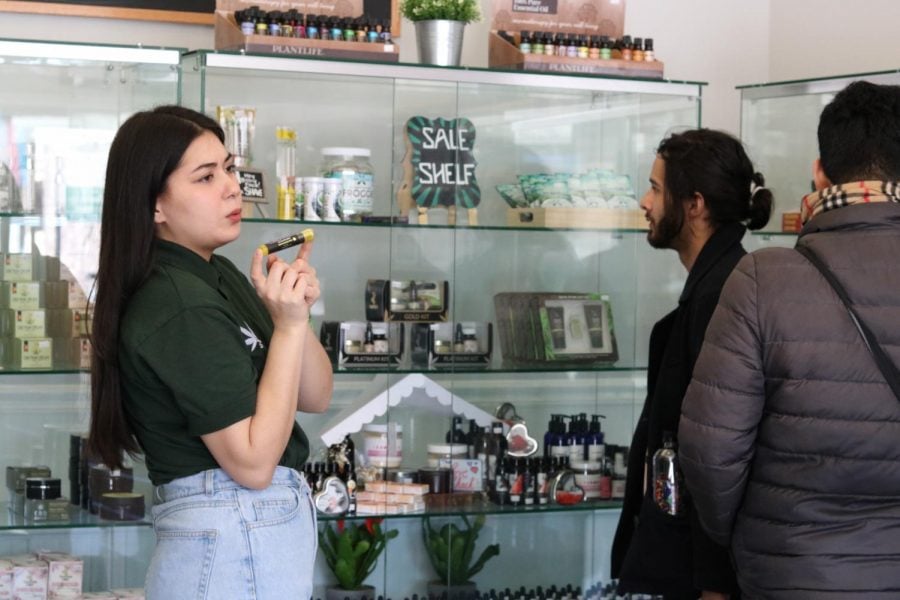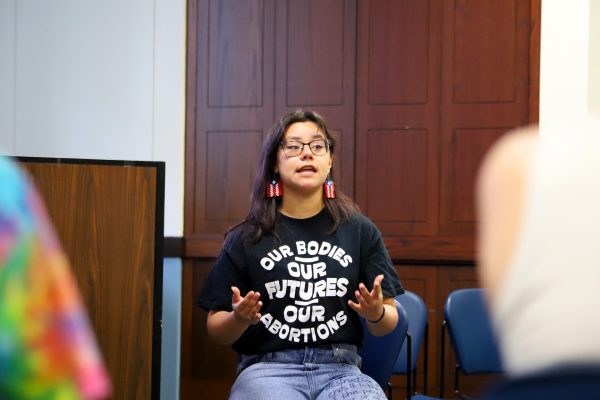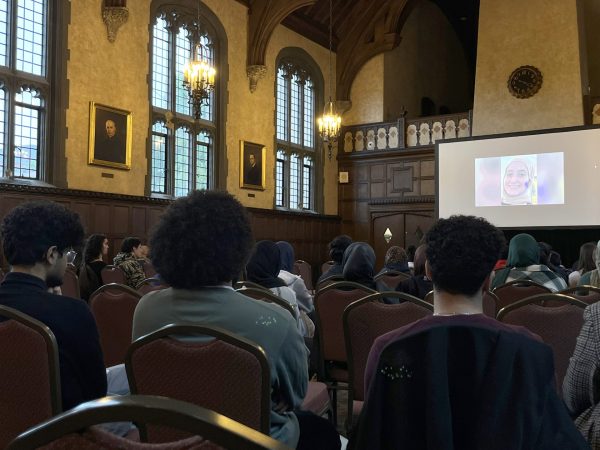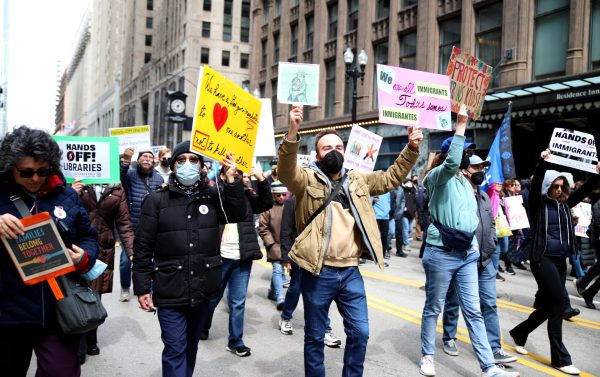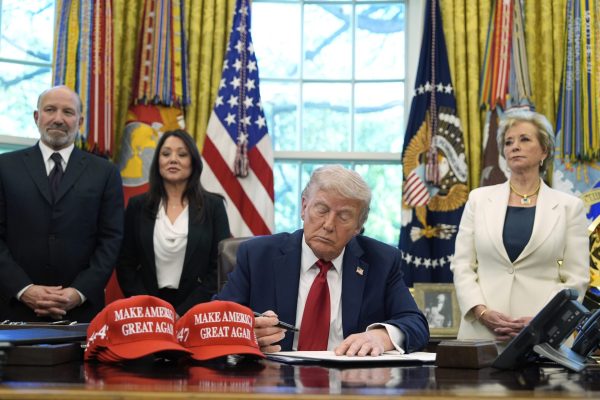CBD takes off as miracle drug while sister compound remains illegal
Credit: Brita Huengs | The DePaulia
Danielle Larson, manager of CBD Kratom in Lakeview, gives customers the sales pitch on the store’s products.
If an apple a day keeps the doctor away, a CBD-infused gummy a day might keep the doctor and the psychiatrist at bay.
Cannabidiol, or CBD, is a sister compound to tetrahydrocannabinol (THC), the active ingredient in the cannabis plant that is responsible for the plant’s famous ability to get its consumer high.
Unlike THC, CBD won’t put you in a mind-altered state. It’s also not regulated by the Food and Drug Administration [FDA]. Despite this, various CBD-infused products have been steadily becoming more mainstream over the last year.
In Chicago, there are at least five shops dedicated to selling the substance. Yet without many studies conducted due to lack of federal oversight, the properties of CBD remain a mystery to much of the public.
Tom Gliszewski, 29, started the Chicago Cannabis Company in 2018. He touts the business as a health and wellness company. Gliszewski is an advocate for using CBD in a wide variety of forms and sees the new-found success the product enjoys as a loop, where the more exposure it gets, the more people are interested and the more people are interested the more it is marketed,
“The fact that you’re seeing cannabis products in health food stores has a lot to do with it,” Gliszewski said. “People are more open to the fact that, ‘Oh I can use cannabis, or a part of the cannabis plant and it won’t necessarily get me intoxicated.’ People are finding that to be a good option for them.”
Although CBD is not considered a controlled substance, there are also no legal parameters around it. But because it is not an FDA-approved drug, companies cannot technically make any health claims on behalf of it. To work around this, Chicago Cannabis Company chooses to present customers with relevant research so they can make their own decisions.
However, there is a slew of research that supports CBD as a viable medicine. The National Cancer Institute [NCI] says that the cannabinoid may “relieve pain, lower inflammation, and decrease anxiety” in patients. The NCI has also proven that CBD can be used as a therapy to treat recurrent tumors, graft-versus-host disease, and nausea. The U.S. National Library of Medicine published a study conducted at New York University School of Medicine that endorsed CBD as a potential treatment for anxiety disorders.
Additionally, health professionals are stepping in and citing anecdotal evidence from their fieldwork to encourage CBD as a medicinal resource. Kim Amer, an associate professor of nursing at DePaul University, sees the substance as an alternative to traditional drugs. She remembers being a student nurse in the 1980’s, and that even back then professionals in the field understood the its effect on cancer patients nausea and mood.
“Most people who go through cancer are not real happy,” Amer said. “There are some oncologists that will start everyone on antidepressants, but I feel like it was be good to start with a less heavy-duty pharmacological drug than that, and try the CBD oil.”
There is also evidence to suggest that CBD can help walk back the opioid crisis. In Illinois alone there were 2,109 opioid related deaths in 2017, rising steadily to this number since 2014, according to the Illinois Department of Public Health. A study published by the National Institute of Health provides evidence that CBD can be used as a therapy to combat this addiction.
Amer hasn’t herself treated anyone in this way, but she knows other people who have, and done so successfully.
“I think that it can either be tried as the primary treatment for pain or as an accessory drug. Opioids just are becoming a nightmare,” Amer said. “And part of that is irresponsible prescribing by physicians.”
Part of Amer’s affinity for encouraging use of the substance medicinally is that it has very few side effects. Unlike over prescription of other pharmaceuticals, there is little risk of mismanagement. “Just like any herbal supplement or drug, a lot depends on the person so it’s something that people just need to experiment with and try and start with low dosing and then go up. The thing that’s good about it in my mind is that it’s very benign,” said Amer.
A World Health Organization study conducted last May concluded that CBD has no potential to induce dependency or to be abused.
This past August, Illinois passed a law that enables cannabis to be used in scenarios that opioids would, in the past, be prescribed.
Still, there are some skeptics who have not been converted to proponents of CBD. A Vox report found that most of CBD products on the market often contain little-to-no actual CBD. Gliszewski, whose company tests for potency in all their products and is transparent to consumers about the results, says he can understand people’s hesitancy around the concept.
“A water with five milligrams of CBD, that’s an example of a product that is using CBD as a buzzword just to sell more products, or sell them at a markup,” Gliszewski said. “Or CBD cocktail at the bar where they added a little bit of CBD in there and they’re going to charge you two to three bucks extra for that same cocktail.”
While CBD can be derived from hemp plant, when it is, it includes no traces of THC. However, it can also be extracted from cannabis and in these cases, it is known as being a “full spectrum extract” and does contain other compounds, like THC.
In December of 2018, President Trump legalized industrialized hemp farming. This goes against decades of conservative policy aimed at suppressing anything related to marijuana production. But to Gliszewski, the move was a natural one, even though it came out of Trump’s right-wing administration, “It just makes economic sense. The cannabis plant has been criminalized and persecuted since the 1930s, and I think it’s time for the politicians to catch up w the public demand for this product,” said Gliszewski. “Farmers are now able to grow another crop and i think for rural parts of the country where some farmers are really struggling right now, this could be a good way to make some money. I’m happy about it, regardless of who passed the law.”
The implications of CBD are offset by its equally playful side. Danielle Larsen, 26, manages CBD Kratom in Lakeview. Their Boystown location is just one of four in the city, with others in Missouri and Texas as well.
Larsen frequently starts her mornings with a cup of CBD infused coffee, she says it offsets the caffeine and smoothens out the jitteriness it can induce. Customers of CBD Kratom can pick up single-serve edibles, caramels or lollipops. She’s the one who recommends a regiment of one CBD gummy a day.
Some of Larsen’s best customers come in on four legs, “We get a lot of fun people in the neighborhood looking for stuff for their pets.”
Just before Illinois passes one year of the Compassionate Use of Medical Cannabis Program, Chicago Cannabis Company will celebrate their one year anniversary this month. Gliszewski remains optimistic about the future of the industry, whether or not it remains a, technically, unverified market, “As far as I know the industry is moving forward with this product, regardless of what the FDA is doing right now. Really they’re just not putting forth regulation,” said Gliszewski.
Oh, and when he’s a good boy, Gliszewski rewards his dog with CBD treats too.


